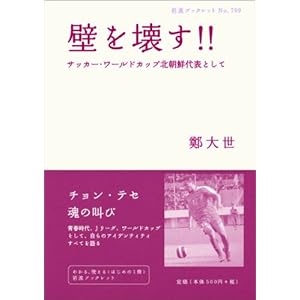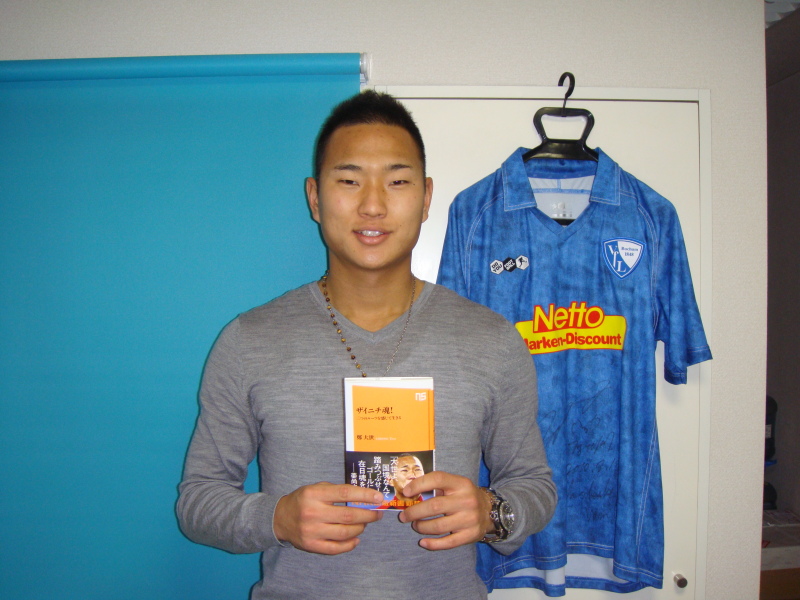Il 3 e il 5 marzo iniziano rispettivamente la J-League 2 e la J-League, i campionati giapponesi di seconda e prima divisione.
In questi campionati militano diversi giocatori Zainichi, coreani etnici nati in Giappone.
Tra questi sono numerosi i calciatori che hanno scelto la nazionalità della RPD di Corea, i cosiddetti Chongryon.
Questa la lista dei giocatori, divisi per squadra:
J-League 1 :
 Avispa Fukuoka
Avispa Fukuoka
Son Jeong Ryun
Centrocampista sinistro
18/09/1991
 Cerezo Osaka
Cerezo Osaka
Kim Song Gi
Difensore centrale
23/10/1988
3 presenze in nazionale
Gamba Osaka
Kim Jong Ya
Difensore
17/05/1988
 Jubilo Iwata
Jubilo Iwata
Hwang Song Su
Attaccante
10/07/1987
 KashiwaReysol
KashiwaReysol
An Yong Hak
Centrocampista centrale
25/10/1978
23 presenze, 2 reti in nazionale
57 presenze, 3 reti in J-League1 (Albirex Niigata, Nogoya Grampus)
73 presenze, 4 reti in J-League2 (Albirex Niigata)
44 presenze, 7 reti in K-League1(Busan I'Park, Suwong Bluewings)
 Vegalta Sendai
Vegalta Sendai
Ryang Yong Gi
Centrocampista offensivo
07/01/1982
10 presenze, 8 reti in nazionale
34 presenze, 11 reti in J-League1 (Vegalta Sendai)
254 presenze, 47 reti in J-League2 (Vegalta Sendai)
J-League 2
F .C.Gifu
.C.Gifu
Ri Han-Jae
Centrocampista destro
27/06/1982
7 presenze, 1 rete in nazionale
92 presenze, 5 reti in J-League1 (Sanfrecce Hiroshima)
61 presenza, 2 reti in J-League2 (Sanfrecce Hiroshima, Consoldale Sapporo, FC Gifu)
 Sagan Tosu
Sagan Tosu
Kim Myung-Hwi
Difensore
8/05/1981
30 presenze in J-League2 (Kataller Toyama)
 Kataller Toyama
Kataller Toyama
Kang Hyun-Su
Attaccante
16/06/1984
34 presenze, 1 rete in J-League2 (Kataller Toyama)
 Kyoto Sanga F.C.
Kyoto Sanga F.C.
Kim Seong Yong
Attaccante
26/02/1987
2 presenze, 1 rete in nazionale
16 presenze, 2 reti in J-League1 (Kyoto Sanga FC)
 Oita Trinita
Oita Trinita
Kang Song Ho
Centrocampista difensivo
28/05/1987
27 presenze in J-League2 (Oita Trinita)
Il campionato giapponese è visibile grazie al canale satellitare Eurosport o in streaming.
Qui l'elenco delle partite:
http://www.the-rising-sun-news.com/news/index.php?option=com_content&view=article&id=2588&Itemid=125
 Jong Il Gwan, a quarterback, received the MVP award at the championships. Since he was 9—he was attending the Pyongyang Hasin Primary School—Jong has played football. Even in his childhood Jong was elastic in driving a ball, fast in speed and quick of sense to score, cutting a conspicuous figure in boys’ football games. His skills have remarkably improved later since he joined a sports team. He habitually likes reading and has set himself the goal of mastering three foreign languages. His intellectual power is manifested in his good command of football techniques.
Jong Il Gwan, a quarterback, received the MVP award at the championships. Since he was 9—he was attending the Pyongyang Hasin Primary School—Jong has played football. Even in his childhood Jong was elastic in driving a ball, fast in speed and quick of sense to score, cutting a conspicuous figure in boys’ football games. His skills have remarkably improved later since he joined a sports team. He habitually likes reading and has set himself the goal of mastering three foreign languages. His intellectual power is manifested in his good command of football techniques. This was his first international game. But he fully displayed his forte—keeping composure, quick in circumstantial judgment and infallible in passing the ball.
This was his first international game. But he fully displayed his forte—keeping composure, quick in circumstantial judgment and infallible in passing the ball. In the recent games he was most watched after by the opponent players. He was a constant threat to the opponent goalkeeper because of his sudden thrust and bold kicking. Quick thrust into the goal area is his forte. He would suddenly dash not only into the centre but also into the right and left of the opponents’ defence area to make opportunities for other players to win a score. His brilliant activity guaranteed the victory in the championships.
In the recent games he was most watched after by the opponent players. He was a constant threat to the opponent goalkeeper because of his sudden thrust and bold kicking. Quick thrust into the goal area is his forte. He would suddenly dash not only into the centre but also into the right and left of the opponents’ defence area to make opportunities for other players to win a score. His brilliant activity guaranteed the victory in the championships. “Modern football is a coaches’ war of intelligence” is a motto written on the front page of People’s Athlete Yun Jong Su’s diary, head coach of the football team.
“Modern football is a coaches’ war of intelligence” is a motto written on the front page of People’s Athlete Yun Jong Su’s diary, head coach of the football team. Il Consiglio Internazionale dello Sport Militare (CISM) ha divulgato le nazionali partecipanti ai Mondiali militari, in programma a Rio de Janeiro 2011, tra il 13 e il 23 luglio.
Il Consiglio Internazionale dello Sport Militare (CISM) ha divulgato le nazionali partecipanti ai Mondiali militari, in programma a Rio de Janeiro 2011, tra il 13 e il 23 luglio.







 7 aprile 2012 DPR Corea – Sri Lanka
7 aprile 2012 DPR Corea – Sri Lanka